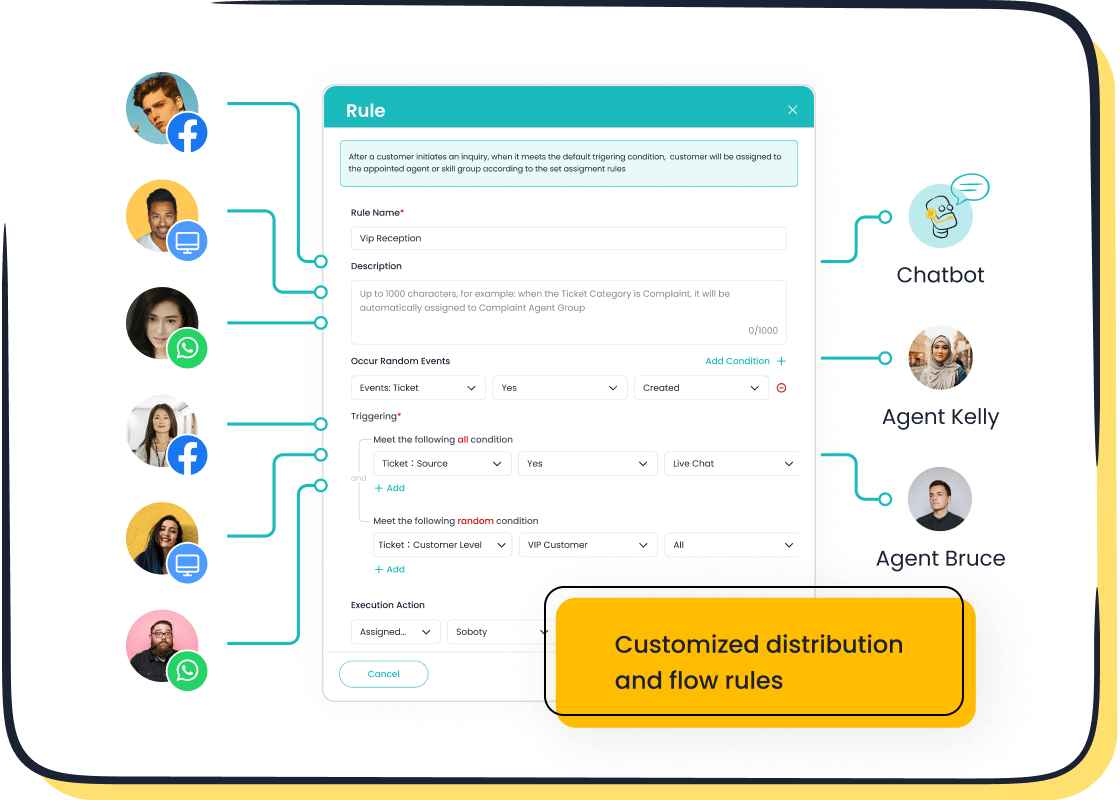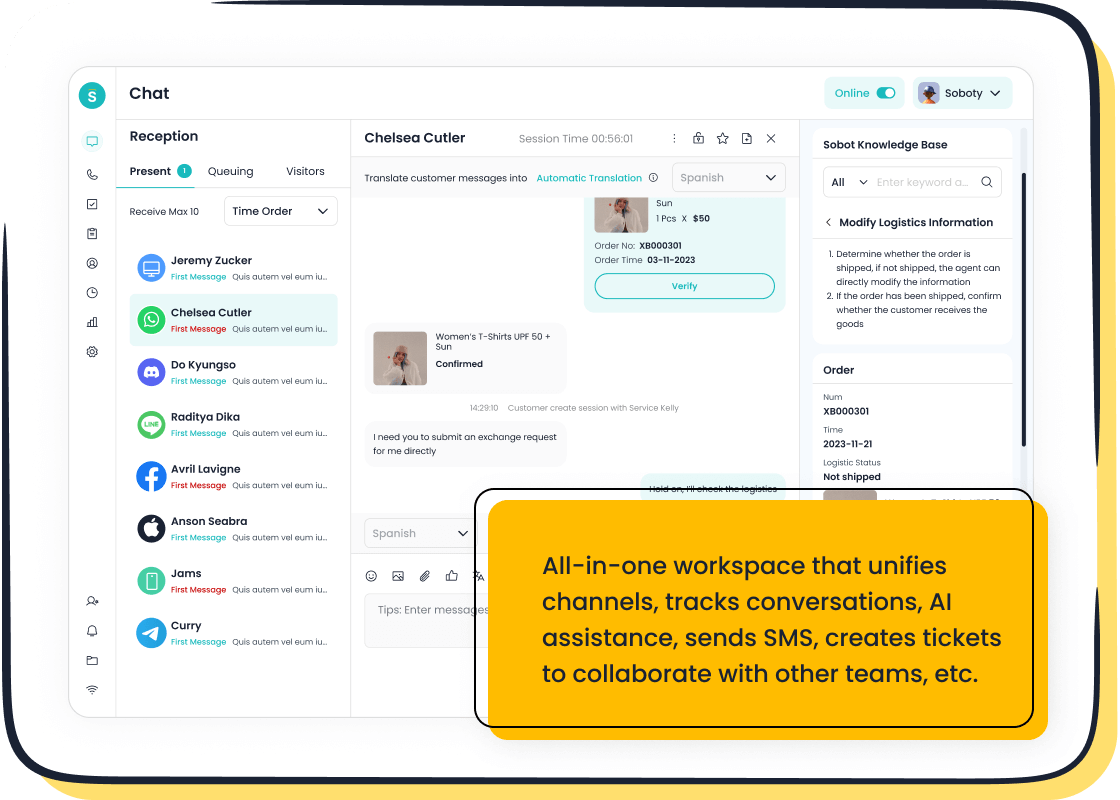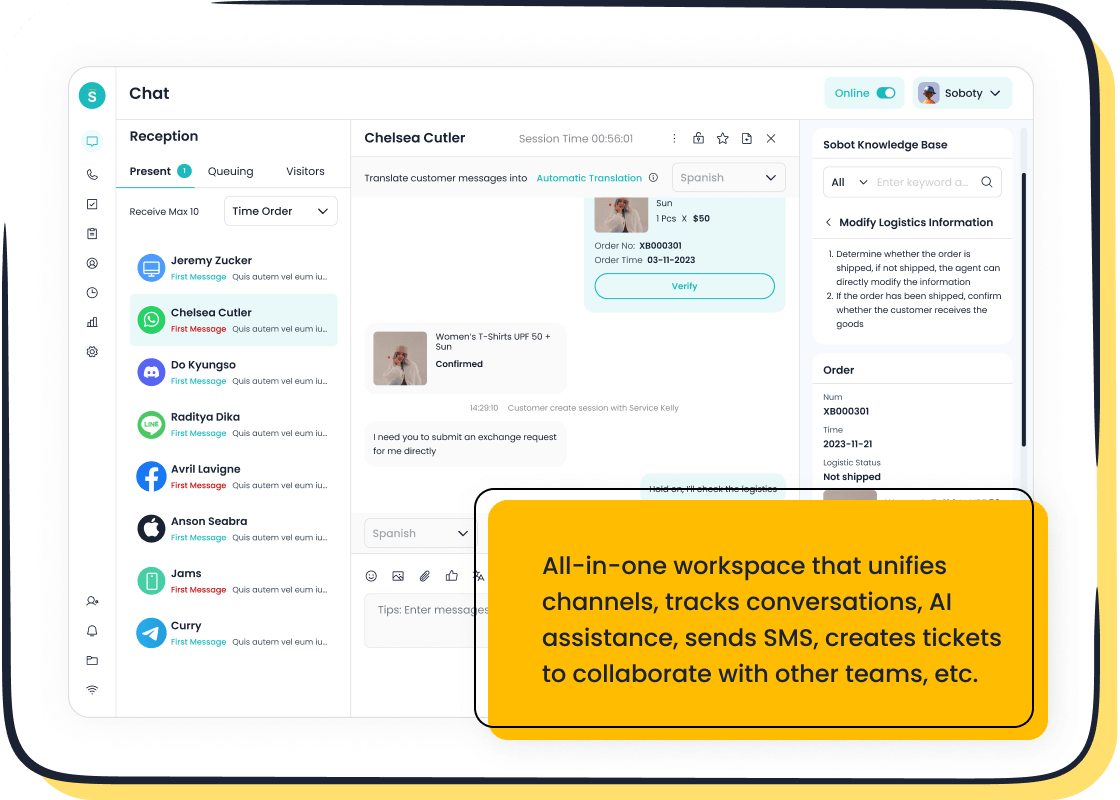AI-Powered Customer Support Software Trends to Watch

Artificial intelligence (AI) is transforming the landscape of customer support, especially with the rise of advanced solutions like Sobot. By enabling faster responses, personalized interactions, and improved efficiency, AI is setting new standards for customer service. In fact, 90% of customers now expect instant replies, and 61% prefer AI-driven solutions over waiting for human agents. This trend underscores the critical role of AI customer support software in the US.
As we approach 2025, staying ahead of AI advancements is crucial for businesses. Nearly 80% of customer service leaders plan to increase their investments in AI, aiming to elevate customer experiences while reducing operational costs. Sobot's AI-powered customer support software exemplifies this shift by unifying communication channels, allowing businesses to meet growing customer expectations and streamline their operations.
Tip: Companies leveraging AI save significant time and resources. For instance, chatbots can save representatives up to 2 hours and 20 minutes daily, enabling them to focus on more complex customer issues.
In today’s fast-paced world, AI isn’t just an option—it’s a necessity for delivering exceptional customer experiences.
Current AI Trends in Customer Support

Artificial intelligence continues to redefine customer support, offering innovative solutions that enhance efficiency and customer satisfaction. Let’s explore the key trends shaping the future of customer support software.
Chatbots and Virtual Assistants
Evolution of Chatbot Capabilities
AI-powered chatbots have evolved significantly over the years. Early versions could only handle basic queries, but today’s chatbots leverage advanced natural language processing (NLP) to understand context and intent. These tools can now manage complex conversations, provide personalized responses, and even predict customer needs. For example, Sobot’s AI-powered chatbots offer multilingual support and 24/7 availability, ensuring seamless communication across global markets.
The chatbot industry is projected to grow to $1.25 billion by 2025, up from $190.8 million in 2016. This growth highlights the increasing reliance on AI customer service tools to meet rising customer expectations.
Use Cases in Customer Support
Chatbots excel in handling repetitive tasks, such as answering FAQs or processing refunds. Businesses using AI-powered chatbots report faster response times and improved customer satisfaction. These tools can manage up to 80% of routine inquiries, freeing human agents to focus on complex issues. For instance, Sobot’s chatbots helped OPPO achieve an 83% resolution rate, demonstrating their effectiveness in real-world applications.
Note: Chatbots save businesses up to 2.5 billion hours annually, making them indispensable in modern customer support.
AI-Driven Self-Service Solutions
Knowledge Bases and Automated FAQs
AI-driven self-service solutions empower customers to find answers independently. Automated FAQs and intelligent knowledge bases use AI to provide accurate, real-time solutions. Sobot’s integration of artificial intelligence enables businesses to maintain up-to-date knowledge bases with minimal effort, as seen in OPPO’s 90% reduction in maintenance efforts.
| Metric | Description |
|---|---|
| Average Response Time | Measures the time taken to respond to customer inquiries. |
| First Call Resolution Rate | Indicates the percentage of issues resolved on the first contact. |
| Customer Satisfaction Score | Reflects customer feedback on their support experience. |
| Agent Productivity Metrics | Assesses the efficiency and output of support agents. |
Benefits for Customer Satisfaction and Cost Reduction
Self-service tools enhance customer satisfaction by providing instant, accurate answers. They also reduce operational costs by minimizing the need for human intervention. Businesses adopting these solutions report higher efficiency and improved customer experiences, aligning with current trends in customer support software.
Sentiment Analysis and Real-Time Feedback
How AI Analyzes Customer Emotions
AI uses sentiment analysis to interpret customer emotions from text, voice, or chat interactions. This technology identifies positive, neutral, or negative sentiments, enabling businesses to respond appropriately. Real-time solutions like Sobot’s Live Chat use sentiment analysis to prioritize urgent issues, ensuring timely resolutions.
Applications in Improving Service Quality
Sentiment analysis helps businesses adapt strategies based on customer emotions. For example, during product launches, companies can monitor feedback to make immediate adjustments. This approach not only improves service quality but also builds trust and loyalty. Identifying recurring issues through sentiment analysis further enhances overall customer support.

Tip: Real-time sentiment analysis boosts customer satisfaction by enabling proactive support, a key trend in AI customer service.
Emerging Trends in AI Customer Service for 2025
Hyper-Personalization in AI Customer Support Software
AI's role in delivering tailored customer experiences
AI is revolutionizing personalization in customer interactions. By analyzing customer data, AI identifies preferences and behaviors, enabling businesses to deliver tailored experiences. For example, AI can recommend products based on past purchases or adjust communication styles to match customer preferences. This level of personalization enhances satisfaction and loyalty. Studies show that 76% of customers feel frustrated when their experience lacks personalization, while 56% are more likely to become repeat buyers when interactions are personalized. Businesses using hyper-personalized interactions often see revenue increases of 10-15%.
Examples of hyper-personalized support interactions
Hyper-personalized interactions include AI-driven chatbots that greet customers by name and suggest solutions based on their history. Sobot’s Live Chat excels in this area by using AI to segment customers and provide targeted support. For instance, a returning customer might receive faster service or exclusive offers, creating a more engaging experience. These interactions not only improve customer satisfaction but also drive business growth.

Omnichannel Integration with Sobot Live Chat
Definition and importance of seamless channel transitions
The rise of omnichannel support has made seamless transitions between communication channels essential. Customers expect to switch from email to chat or social media without repeating themselves. Omnichannel integration ensures consistent support across platforms, meeting these expectations. Sobot Live Chat unifies customer data, enabling agents to access complete interaction histories. This approach improves efficiency and enhances the overall experience.
AI's role in unifying customer data across platforms
AI plays a critical role in omnichannel integration by automating data collection and analysis. Sobot’s tools use AI to consolidate customer information, providing agents with real-time insights. This unification allows businesses to deliver consistent and efficient support. For example, an agent can resolve an issue faster by accessing a customer’s previous interactions across channels. Such capabilities highlight the importance of AI in modern customer support.
Predictive Analytics and Proactive Support
Anticipating customer needs before they arise
Predictive analytics uses AI to analyze patterns and anticipate customer needs. This proactive customer support approach allows businesses to address issues before they escalate. For instance, AI can predict when a product might require maintenance and notify the customer in advance. This reduces downtime and enhances satisfaction. Studies show that predictive analytics improves resolution times and strengthens customer relationships.
Examples of predictive AI in action
Predictive AI applications include identifying potential issues through data analysis and offering solutions proactively. Sobot’s AI tools excel in this area by providing agents with actionable insights. For example, during a product launch, predictive analytics can identify common questions and prepare agents with preemptive responses. This not only improves efficiency but also builds trust and loyalty among customers.
AI-Powered Voice Support
Advances in natural language processing (NLP)
AI-powered voice support has seen remarkable advancements, particularly in natural language processing (NLP). This technology enables AI to understand and respond to human speech with greater accuracy. Modern NLP systems can recognize accents, detect emotions, and even handle interruptions during conversations. These capabilities make AI voice support more intuitive and human-like. For instance, Sobot's Voice Call Center uses NLP to transcribe calls and analyze customer sentiment in real time, ensuring efficient and empathetic interactions.
Enhancing call center efficiency with AI
AI significantly improves call center efficiency by automating routine tasks and optimizing workflows. It reduces call handling time by intelligently routing calls and addressing common queries autonomously. The table below highlights key improvements:
| Improvement Type | Description |
|---|---|
| Call Handling Time | Dasha Voice AI reduces call handling time by intelligently routing calls and autonomously handling common queries. |
| Cost Savings | Automation leads to a decrease in the number of agents required, significantly lowering labor costs. |
| Customer Satisfaction Ratings | Post-implementation surveys show higher customer satisfaction ratings due to efficient and accurate responses. |
By integrating AI into your call center, you can enhance productivity, reduce costs, and improve customer satisfaction.
AI and Multilingual Support
Real-time translation for global customer bases
AI-driven multilingual support breaks language barriers, enabling businesses to serve global customers seamlessly. Real-time translation tools allow you to communicate with customers in their preferred language, fostering trust and satisfaction. For example, Vodafone New Zealand launched Red Connect, a service tailored for Chinese-speaking customers. Delina Shields, Vodafone’s Head of Segment Marketing, stated, "By removing the language barrier for our Chinese-speaking customers, we aim to make their interaction with us seamless and enjoyable – it’s all about improving the customer experience and building the relationship."
Benefits for international businesses
Multilingual AI tools offer significant advantages for international businesses. These tools ensure consistent communication across regions, enhancing customer experiences. Key benefits include:
- 31% of customers expect personalized interactions.
- 55% of respondents reported that translation positively impacts business growth.
- Over half (52%) of businesses globally don’t communicate in real-time in the language of their customers.
Sobot’s Live Chat includes auto-translation features, making it easier for businesses to engage with diverse audiences. This capability not only improves customer satisfaction but also drives global expansion.
Practical Applications and Benefits of AI in Customer Support

Cost Savings and Operational Efficiency
Reducing reliance on human agents for repetitive tasks
AI in customer support has revolutionized how businesses handle repetitive tasks. AI-powered problem solving, such as chatbots and virtual assistants, can manage up to 80% of routine inquiries. This reduces the need for human agents to address repetitive questions like FAQs or order tracking. For example, Sobot’s AI-driven help desks allow agents to focus on complex issues, improving productivity and reducing wait times. Companies adopting AI customer service tools report a 35% reduction in operational costs, making it a cost-effective solution for scaling support operations.
Streamlining workflows with AI automation
AI-driven automation simplifies workflows by integrating predictive analytics and real-time solutions. These tools analyze customer queries, predict needs, and route issues to the right agents. This ensures faster resolutions and enhanced efficiency. Organizations using AI report a 32% increase in revenue due to streamlined operations. Sobot’s customer support software excels in this area by unifying communication channels and automating repetitive tasks, enabling businesses to deliver a seamless customer experience.
Enhancing Customer Satisfaction with Sobot Live Chat
Faster response times and 24/7 availability
Customers expect instant responses, and AI-driven customer experience tools like Sobot Live Chat meet this demand. With 24/7 availability, Sobot ensures no query goes unanswered. AI chatbots handle multiple inquiries simultaneously, reducing wait times and improving satisfaction. A recent study shows that 73% of customers prefer live chat, and Sobot’s platform achieves a 92% satisfaction rate, demonstrating its effectiveness in delivering real-time solutions.
Personalized and empathetic interactions
AI enables hyper-personalized interactions by analyzing customer data to provide tailored responses. Sobot Live Chat uses predictive analytics to segment customers and offer personalized recommendations. For instance, returning customers might receive exclusive offers or faster service. This approach fosters loyalty and enhances the overall customer experience. Studies reveal that 87% of consumers appreciate proactive contact, and 77% view brands with proactive service more favorably.
| Metric | Value |
|---|---|
| Customer preference for live chat | 73% |
| Customer satisfaction rate | 92% |
| Consumers wanting proactive contact | 87% |
Data-Driven Decision Making
Leveraging AI insights to improve support strategies
AI-driven customer support software provides actionable insights by analyzing customer interactions. These insights help businesses refine their strategies and improve service quality. For example, predictive analytics identifies recurring issues, enabling proactive solutions. Sobot’s integration of artificial intelligence equips businesses with data-driven personalized experiences, ensuring consistent service improvements.
Examples of AI-driven optimizations
Companies using AI report a 37% reduction in first response times and a 68% decrease in staffing needs during peak seasons. Sobot’s AI help desk uses predictive analytics to prepare agents for common queries, enhancing efficiency. By leveraging these tools, businesses can optimize workflows and deliver superior customer support.

Tip: Data-driven strategies powered by AI not only improve efficiency but also build trust and loyalty among customers.
Challenges and Considerations in AI Customer Service Tools
Balancing Automation with Human Touch
Avoiding over-reliance on AI
AI customer service tools excel at handling repetitive tasks and providing quick responses. However, relying too much on AI can lead to a lack of empathy in customer interactions. Customers often feel frustrated when they need to repeat information after switching from an AI chatbot to a human agent. To avoid this, you should integrate AI systems with human workflows. This ensures agents can access the full conversation history, creating a seamless transition. Research shows that 53% of support teams worry about AI harming customer service, while 44% avoid AI because customers prefer human interaction. Balancing efficiency with empathy is essential for building trust and loyalty.
Ensuring human agents handle complex issues
AI-driven automation handles routine inquiries effectively, but human agents remain vital for addressing complex problems. For example, Sobot’s AI help desk allows agents to focus on intricate issues by automating repetitive tasks. This collaboration between AI and humans ensures that customers receive both quick resolutions and personalized recommendations. Studies reveal that 49.5% of customer service specialists believe humans and AI should work together to resolve requests.
Data Privacy and Security
Protecting customer data in AI systems
AI systems process vast amounts of customer data, making privacy a top concern. A recent study found that 40% of organizations have experienced an AI privacy breach, and 57% of global consumers view AI as a threat to their privacy. To address these concerns, you should implement robust security measures, such as encryption and access controls. Sobot’s customer support software prioritizes data security, ensuring compliance with industry standards.
Compliance with regulations like GDPR and CCPA
Regulations like GDPR and CCPA require businesses to handle customer data responsibly. Non-compliance can result in hefty fines and damage to your reputation. A Cisco report revealed that 91% of organizations feel the need to reassure customers about AI data usage. By adopting AI-driven customer experience tools that comply with these regulations, you can build trust and protect your brand.
| Evidence Type | Description |
|---|---|
| AI Privacy Breach | 40% of organizations have experienced an AI privacy breach. |
| Consumer Threat Perception | 57% of global consumers view AI in data processing as a significant threat. |
| Trust in Companies | 70% of US adults have little to no trust in companies regarding AI data use. |
| Need for Reassurance | 91% of organizations feel they need to reassure customers about AI usage. |

Implementation and Integration Challenges
Adapting legacy systems to AI solutions
Many businesses still rely on legacy systems, which can complicate AI integration. Studies show that 70% of enterprises use outdated infrastructure, and 50% of AI projects fail due to integration issues. For example, a global insurance company struggled to integrate AI fraud detection with its COBOL-based claims system. To overcome these challenges, you should invest in scalable AI solutions like Sobot’s customer support software, which integrates seamlessly with existing systems.
Training staff to work alongside AI tools
Introducing AI requires training your team to use these tools effectively. Employees need to understand AI’s capabilities and limitations to collaborate efficiently. Sobot’s AI-powered problem solving tools simplify workflows, allowing agents to focus on delivering hyper-personalized interactions. By upskilling your staff, you can maximize the benefits of AI-driven customer experience solutions.
Tip: Investing in training ensures your team can adapt to AI advancements, improving both efficiency and customer satisfaction.
Preparing Your Business for AI Trends in Customer Support Software
Assessing Your Current Customer Support Strategy
Identifying areas where AI can add value
To prepare for AI advancements, you must first evaluate your current customer support strategy. Identify areas where AI can enhance efficiency and customer satisfaction. For example, AI excels at automating repetitive tasks like answering FAQs or processing refunds. It also improves personalization by analyzing customer data to deliver tailored solutions. Businesses using AI customer service tools often report faster response times and better customer experiences. By pinpointing these opportunities, you can focus on areas that will benefit most from AI-powered problem solving.
Conducting a gap analysis
A gap analysis helps you understand where your current strategy falls short. Compare your existing capabilities with customer expectations and industry standards. For instance, if your response times are slower than competitors, consider implementing AI-driven automation. Tools like Sobot’s Live Chat can reduce wait times and improve satisfaction by providing 24/7 support. This analysis ensures you allocate resources effectively and prioritize the right AI solutions.
Investing in the Right AI Tools
Evaluating software solutions for your business needs
Choosing the right AI tools requires careful evaluation. Look for solutions that align with your goals, such as improving efficiency or enhancing personalization. AI-powered customer support software like Sobot offers features like omnichannel integration, predictive analytics, and multilingual support. These capabilities ensure consistent service quality and scalability. Businesses adopting AI tools often experience cost savings, faster response times, and increased customer retention.
Partnering with reliable AI vendors
Collaborating with a trusted AI vendor ensures a smooth implementation process. Vendors like Sobot provide comprehensive solutions tailored to your needs. For example, Sobot’s AI help desk integrates seamlessly with existing systems, simplifying workflows and enhancing productivity. Reliable vendors also offer ongoing support and updates, helping you stay ahead of emerging trends.
Training and Upskilling Your Team
Educating staff on AI capabilities and limitations
Your team plays a crucial role in maximizing the benefits of AI. Educate employees on how AI works and its limitations. For instance, while AI handles routine tasks efficiently, human agents remain essential for complex issues. Training programs can help staff understand how to collaborate with AI tools like Sobot’s Live Chat, which uses predictive analytics to assist agents in delivering personalized service.
Encouraging collaboration between AI and human agents
A hybrid approach combining AI and human expertise ensures a seamless customer experience. Encourage your team to leverage AI insights for better decision-making. For example, Sobot’s AI tools provide actionable data, enabling agents to address customer needs proactively. This collaboration not only improves efficiency but also fosters trust and loyalty among customers.
Monitoring and Adapting to Trends
Staying informed about AI advancements
AI evolves rapidly, making it essential for you to stay updated on the latest developments. New technologies, such as advanced natural language processing or predictive analytics, can significantly enhance your customer support operations. By keeping track of these advancements, you can identify opportunities to improve your customer support software and maintain a competitive edge.
You can monitor industry trends through reliable sources like research reports, AI conferences, and expert blogs. For example, Gartner predicts that by 2025, 60% of customer service interactions will involve AI. Staying informed about such trends allows you to anticipate changes and adapt your strategies accordingly. Tools like Sobot’s AI-powered customer support software already integrate cutting-edge features, such as omnichannel support and real-time sentiment analysis, ensuring you remain ahead of the curve.
Continuously refining your AI strategy
Adapting your AI strategy requires regular evaluation of its performance. Metrics like response times, customer satisfaction scores, and ROI help you measure the effectiveness of your AI customer service tools. For instance, tracking process efficiency can reveal areas where automation could further streamline workflows. Similarly, analyzing customer-centric metrics ensures your AI aligns with their expectations, enhancing their overall experience.
Refining your strategy also involves scaling AI applications across your organization. Sobot’s solutions, such as Live Chat, unify communication channels and provide actionable insights, making it easier to adapt and expand your AI initiatives. By continuously monitoring these metrics, you can identify gaps, optimize your tools, and ensure your customer support remains efficient and effective.
Tip: Regularly reviewing your AI strategy not only improves performance but also ensures alignment with your business goals.
AI continues to redefine customer support, shaping the future of customer service trends. By 2025, businesses adopting AI customer service tools will see transformative benefits, including enhanced engagement, reduced costs, and improved satisfaction. For instance, 73% of organizations report better customer engagement through AI, while companies using AI-driven solutions achieve a 25% reduction in operational costs. These advancements highlight the growing importance of AI customer support software in the US.
To remain competitive, you must embrace these innovations. Tools like Sobot’s Live Chat unify communication channels, streamline workflows, and deliver hyper-personalized experiences. As 80% of companies already use AI to improve customer experience, now is the time to act. Prepare your business for the future by integrating AI-powered customer support software and staying ahead of evolving trends.

Tip: Businesses leveraging AI report a 20% increase in customer satisfaction, proving its value in modern customer support.
FAQ
What are AI customer service tools, and how do they work?
AI customer service tools use artificial intelligence to automate and enhance customer support. They handle tasks like answering FAQs, analyzing sentiment, and providing personalized responses. For example, Sobot’s AI-powered solutions streamline workflows and improve customer satisfaction by offering 24/7 support and multilingual capabilities.
How can AI improve customer satisfaction?
AI improves satisfaction by providing instant responses, personalized interactions, and proactive support. Tools like Sobot’s Live Chat analyze customer data to deliver tailored solutions. Studies show that 73% of customers prefer live chat for its speed and convenience, making AI an essential part of modern customer service.
Are AI tools suitable for small businesses?
Yes, AI tools benefit businesses of all sizes. They reduce costs by automating repetitive tasks and improving efficiency. Sobot’s solutions, for instance, offer scalable features like omnichannel integration and predictive analytics, making them accessible and valuable for small businesses aiming to enhance customer support.
Can AI handle complex customer issues?
AI excels at managing routine inquiries but struggles with complex problems requiring human empathy. Sobot’s AI tools address this by seamlessly transitioning complex cases to human agents. This hybrid approach ensures customers receive both quick resolutions and personalized care.
How does AI ensure data security in customer support?
AI systems prioritize data security through encryption and compliance with regulations like GDPR. Sobot’s customer support software integrates robust security measures, ensuring customer data remains protected while delivering efficient and reliable service.
See Also
Best 10 Customer Feedback Tools to Use in 2024
Enhance SaaS Customer Service Using Live Chat Techniques
Leading 10 Customer Support Applications for 2024
AI-Driven Customer Support Agents Transform Service Experience
Ways AI Customer Support Tools Improve Operational Efficiency